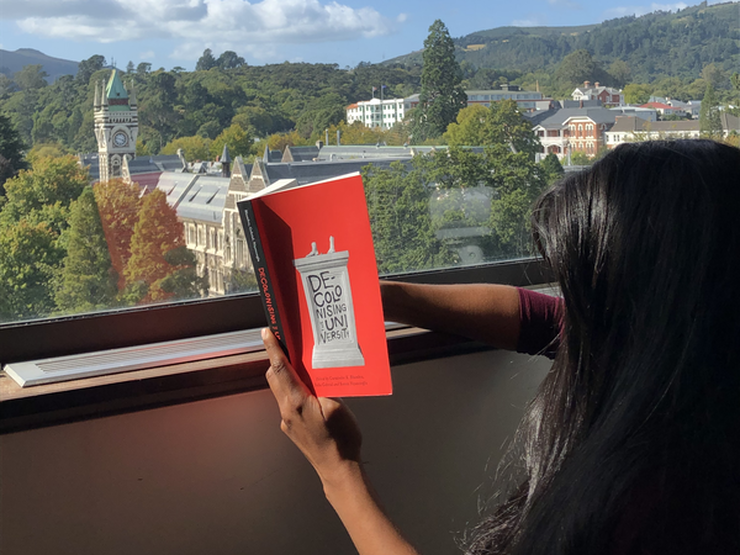|
|
|
Recent calls to decolonise the university in South Africa culminated in the removal of the statue of Cecil John Rhodes at the University of Cape Town and breathed new life into student-led campaigns around the world to rethink the curriculum. Challenging the colonial roots and Western biases of universities is, of course, not a twenty-first century phenomenon. However, in its latest iteration, the need to decolonise the university has been more clearly connected to the lived reality of the corporatised university as a distinct feature of the neoliberal era. Bringing debates on neoliberalism into closer conversation with a consideration of how neocolonialism is expressed in institutions of higher education has allowed for closer scrutiny of what ‘transformation’ actually means.
It has become abundantly clear to many of those who work and study in higher education, that the more things change, the more they stay the same. While the language of transformation has been woven into policies that have widened access to previously marginalised groups (including black and minority ethnic groups, women, indigenous and mature students), institutions of higher learning have a long way to go to dismantle the barriers to success that these groups face once inside the institutions.
My Identities article, ‘Rehumanising the university for an alternative future: decolonisation, alternative epistemologies and cognitive justice’, supports the view that substantive transformation of higher education requires an appreciation of other ways of knowing the world beyond Western epistemologies. Following the work of Portuguese sociologist, Boaventura de Sousa Santos, I argue that we need to complicate the lens through which we look at the world in order to reveal alternatives that are hidden in plain sight. Here, I am using the word ‘complicate’ to suggest a more expansive and intricate set of lenses that, when brought into the same frame, allows us to conceive of a reality that cannot be imagined through a single Western paradigm.
Santos speaks of an ‘ecology of knowledges’ to suggest that different approaches to knowing the world are incomplete in different ways and, therefore, potentially complementary. Inspired by this idea, I use the metaphor of a knowledge kaleidoscope, first, to signal the possibilities that come into view with a slight adjustment of the lens through which we look at the world. Second, the idea of a kaleidoscope will hopefully remind readers of being young and filled with excitement at the thought that the slightest turn of the tube reveals a pattern more fascinating and colorful than the last. Ultimately, my article is intended to cast a more optimistic gaze upon the neocolonial, neoliberal university than is presently the case across much scholarly writing on these topics. If we were to think of language as one lens that we use to understand the world, it follows that the privileging of the English language in academia deprives us all of having access to multiple perspectives on the world. Relying on Fanon’s account of violence in the colonies, I argue that the marginalisation of indigenous and many other languages from the curriculum and scholarship in general is profoundly dehumanising. I ask what might become possible if we had the tools to conceive of reality in different ways. For instance, in te reo (the language of New Zealand’s indigenous people), the word for land or territory is whenua. This very same word is used to denote placenta or afterbirth. If, in the Western world, we conceived of the land as a placenta, I wonder whether the ethic of extractivism that fuels the capitalist economy would be so unimaginable as to be absurd. A more considered integration of multiple languages (and the complexity of meaning that these bring) into our theoretical conceptions of social phenomena arguably would go much further in the quest for decolonisation than the occasional sign on a university building or translated email signatures or letterheads. Questioning whether indigeneity has been side-lined in favour of internationalisation, my article explores the latter as a dimension of neocolonialism. It examines whether internalisation agendas that are being pursued quite aggressively in many universities in New Zealand and elsewhere are exclusively about raising the incomes and global standing of universities or whether – with some input from a wider range of stakeholders, including students – they can be adjusted to respond to the decolonisation imperative.
Blog post by Marcelle C. Dawson, University of Otago, New Zealand
Read the full article: Dawson, Marcelle C. Rehumanising the university for an alternative future: decolonisation, alternative epistemologies and cognitive justice. Identities: Global Studies in Culture and Power. DOI: 10.1080/1070289X.2019.1611072
0 Comments
Your comment will be posted after it is approved.
Leave a Reply. |
|
Explore Identities at tandfonline.com/GIDE |
|
The views and opinions expressed on The Identities Blog are solely those of the original blog post authors, and not of the journal, Taylor & Francis Group or the University of Glasgow.

